
|
Astronomy Picture Of the Day (APOD)
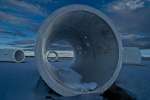 Through a Sun Tunnel
Through a Sun Tunnel
22.12.2011
Today the Sun stands still at 05:30 UT. Halting its steady march toward southern declinations and begining its annual journey north, the event is known as a solstice. In the northern hemisphere December's solstice marks the astronomical start of winter.
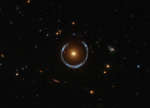 A Horseshoe Einstein Ring from Hubble
A Horseshoe Einstein Ring from Hubble
21.12.2011
What's large and blue and can wrap itself around an entire galaxy? A gravitational lens mirage. Pictured above, the gravity of a luminous red galaxy (LRG) has gravitationally distorted the light from a much more distant blue galaxy.
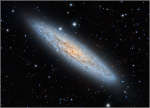 NGC 253: The Sculptor Galaxy
NGC 253: The Sculptor Galaxy
20.12.2011
NGC 253 is not only one of the brightest spiral galaxies visible, it is also one of the dustiest. Discovered in 1783 by Caroline Herschel in the constellation of Sculptor, NGC 253 lies only about ten million light-years distant.
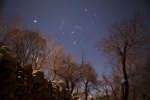 A Geminid Meteor Over Iran
A Geminid Meteor Over Iran
19.12.2011
Some beautiful things begin as grains of sand. Locked in an oyster, a granule grows into an iridescent pearl, lustrous and lovely to behold. While hurtling through the atmosphere at 35 kilometers per second, a generous cosmic sand grain becomes an awe-inspiring meteor, its transient beauty displayed for any who care to watch.
 Hints of Higgs from the Large Hadron Collider
Hints of Higgs from the Large Hadron Collider
18.12.2011
Why do objects have mass? To help find out, Europe's CERN has built the Large Hadron Collider (LHC), the most powerful particle accelerator yet created by humans. Since 2008, the LHC smashed protons into each other with unprecedented impact speeds.
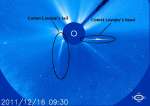 Comet Lovejoy: Sungrazing Survivor
Comet Lovejoy: Sungrazing Survivor
17.12.2011
Like most other sungrazing comets, Comet Lovejoy (C/2011 W3) was not expected to survive its close encounter with the Sun. But it did. This image from a coronograph onboard the sun-staring SOHO spacecraft identifies the still inbound remnants of the tail, with the brilliant head or coma emerging from the solar glare on December 16.
 Red Moon Rising
Red Moon Rising
16.12.2011
This surreal, wintry scene is a composite picture recorded on December 10 as the Moon rose behind the Zagros Mountains of Iran. A total lunar eclipse was already in progress. The image combines nearly 500 successive frames taken over 1.5 hours beginning in twilight as the eclipsed Moon steadily climbed above the rugged landscape.
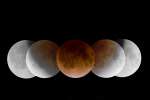 The Umbra of Earth
The Umbra of Earth
15.12.2011
The dark, inner shadow of planet Earth is called the umbra. Shaped like a cone extending into space, it has a circular cross section most easily seen during a lunar eclipse. For example, last Saturday the Full Moon slid across the southern half of Earth's umbral shadow, entertaining moonwatchers around much of the planet.
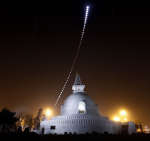 A Lunar Eclipse Over an Indian Peace Pagoda
A Lunar Eclipse Over an Indian Peace Pagoda
14.12.2011
Our Moon turned red last week. The reason was that during December 10, a total lunar eclipse occurred. The above digitally superimposed image mosaic captured the Moon many times during the eclipse, from before the Moon entered Earth's shadow until after the Moon exited.
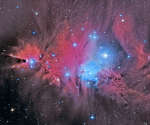 In the Vicinity of the Cone Nebula
In the Vicinity of the Cone Nebula
13.12.2011
Strange shapes and textures can be found in neighborhood of the Cone Nebula. The unusual shapes originate from fine interstellar dust reacting in complex ways with the energetic light and hot gas being expelled by the young stars.
|
January February March April May June July August September October November December |
|||||||||||||||||||||||||||||||||||||||||||||||||